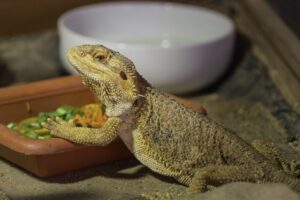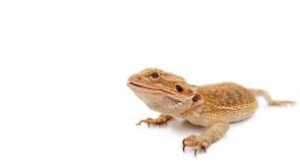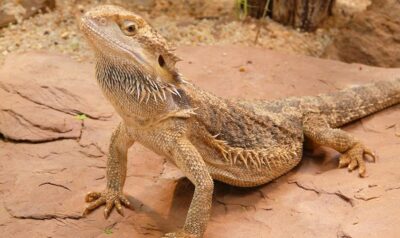One of the common queries that arise among novice and experienced bearded dragon keepers alike is: “How long can a bearded dragon go without eating?” This question stems from a genuine concern for the well-being of these unique reptiles, as understanding their physiological limits is crucial for their care and welfare.
Bearded dragons are resilient reptiles with the ability to tolerate short periods without food. Generally, a healthy adult bearded dragon can go without eating for up to 1-2 weeks without significant adverse effects. However, it’s crucial to monitor the individual’s health closely during this time.
However, several factors influence how long a bearded dragon can go without eating, including its age, size, overall health, and environmental conditions. Juveniles and smaller individuals may have higher metabolic rates and require more frequent feeding, while larger adults may be able to sustain themselves for longer periods.
Understanding Bearded Dragon Diet

Understanding the dietary needs of a bearded dragon is essential for providing optimal care and ensuring their health and well-being. Bearded dragons are omnivorous reptiles native to Australia, known for their voracious appetite and diverse diet. Here’s a comprehensive overview of what to feed your bearded dragon:
- Vegetables and Greens: A significant portion of a bearded dragon’s diet should consist of leafy greens and vegetables. Offer a variety of options such as collard greens, mustard greens, kale, dandelion greens, and turnip greens. These provide essential vitamins, minerals, and fiber necessary for digestion and overall health.
- Fruits: Fruits should be given in moderation due to their higher sugar content. Suitable options include strawberries, blueberries, apples, and mangoes. Be sure to remove any seeds or pits as they can be harmful to your pet.
- Insects: Protein is crucial for the development and maintenance of a bearded dragon’s body. Insects like crickets, dubia roaches, mealworms, and superworms are excellent sources of protein. Offer appropriately sized insects based on the size of your bearded dragon, and ensure they are gut-loaded (fed nutritious foods) before being offered to your pet.
- Supplements: Bearded dragons require calcium and vitamin D3 supplements to maintain strong bones and prevent metabolic bone disease. Dust insects with calcium powder before feeding them to your pet, and provide a multivitamin supplement a few times a week.
- Commercial Diets: Commercial bearded dragon pellets or diets can be a convenient option, but they should not be the sole source of nutrition. Use them as a supplement to a varied diet of fresh greens and insects.
- Water: Hydration is crucial for bearded dragons, especially since they are prone to dehydration. Provide fresh, clean water in a shallow dish daily. Some bearded dragons may prefer to drink from a dropper or spray bottle, so offering water in multiple ways can encourage proper hydration.
- Avoid Toxic Foods: Certain foods are toxic to bearded dragons and should be avoided, including avocado, rhubarb, and spinach. Additionally, avoid feeding your pet insects caught in the wild, as they may have been exposed to pesticides or parasites.
- Feeding Schedule: Bearded dragons should be fed a combination of insects and vegetables daily when they are young, gradually transitioning to a diet of mostly vegetables with fewer insects as they age. Monitor their appetite and adjust feeding frequency accordingly.
By understanding and meeting the dietary needs of your bearded dragon, you can ensure they lead a healthy and fulfilling life. Additionally, consulting with a reptile veterinarian can provide personalized guidance on diet and nutrition based on your pet’s specific needs and circumstances.
Factors Influencing Bearded Dragon’s Ability to Go Without Eating
Bearded dragons, like many reptiles, have unique physiological and behavioral traits that influence their ability to go without eating for certain periods. Several factors can impact their ability to fast or go without eating:
- Age: Young bearded dragons grow rapidly and require more frequent feeding compared to adults. Juveniles typically need to eat every day or every other day, while adults may eat less frequently, sometimes going several days without food.
- Health: Any underlying health issues or diseases can affect a bearded dragon’s appetite and ability to go without eating. Parasites, infections, metabolic disorders, and other illnesses can lead to decreased appetite and weight loss.
- Seasonal Changes: Bearded dragons may exhibit changes in appetite and activity levels based on seasonal variations. During the colder months, they may reduce their food intake and enter a period of decreased activity resembling brumation, which is similar to hibernation in mammals.
- Temperature and Environment: Bearded dragons are ectothermic, meaning their body temperature is regulated by external sources. Temperature plays a crucial role in their metabolism and digestion. If the enclosure’s temperature is too low, their metabolism slows down, reducing their appetite. Conversely, if it’s too high, they may become stressed, which can also affect their eating habits.
- Lighting: Proper lighting, including UVB exposure, is essential for bearded dragons’ overall health and appetite. UVB light helps them metabolize calcium, which is crucial for bone health. Insufficient UVB exposure can lead to metabolic bone disease, impacting their ability to eat and digest food properly.
- Stress: Bearded dragons are sensitive to changes in their environment and may experience stress from factors such as relocation, overcrowding, or the presence of predators or other pets. Stress can suppress their appetite and lead to decreased feeding behavior.
- Reproduction: Female bearded dragons may eat less or stop eating altogether when they are gravid (carrying eggs). This behavior is normal as they redirect energy towards producing and laying eggs.
- Behavioral Factors: Individual differences in temperament and behavior can influence how long a bearded dragon can go without eating. Some individuals may have a more robust appetite and tolerance for fasting periods than others.
It’s important for bearded dragon owners to monitor their pets’ eating habits and behavior closely and to seek veterinary care if they notice any significant changes or concerns regarding appetite and feeding behavior. Providing a suitable habitat with proper lighting, temperature, and nutrition is essential for maintaining their health and well-being.
Signs of Hunger and Malnutrition
Recognizing signs of hunger and malnutrition in bearded dragons is crucial for ensuring their health and well-being. Here are some indicators to watch for:
Signs of Hunger:
- Increased Activity: Hungry bearded dragons may become more active and alert, actively exploring their enclosure in search of food.
- Pacing or Glass Surfing: Restless behavior, including pacing back and forth or repeatedly scratching at the enclosure’s walls (known as glass surfing), can indicate hunger or stress.
- Aggressive Feeding Behavior: When presented with food, hungry bearded dragons may eagerly chase after prey items or aggressively snatch up vegetables and other food offerings.
- Hunting Behavior: If live prey is provided, hungry dragons may exhibit hunting behaviors, such as stalking or pouncing on prey items.
- Vocalization: Some bearded dragons may make soft chirping or hissing sounds when hungry, especially if they associate the sound with feeding time.
- Prolonged Tongue Flicking: Bearded dragons use their tongues to detect scent particles in the air, and increased tongue flicking may indicate heightened interest in finding food.
Signs of Malnutrition:
- Weight Loss: A visible decrease in body weight or a noticeable thinning of the tail base can indicate malnutrition or inadequate food intake.
- Weakness or Lethargy: Malnourished bearded dragons may exhibit reduced activity levels, appearing weak or lethargic compared to their usual behavior.
- Sunken Eyes: Dehydration and malnutrition can cause the eyes to appear sunken or dull.
- Dull or Discolored Skin: Healthy bearded dragons typically have vibrant, colorful skin. Malnourished individuals may exhibit dull or discolored patches of skin, indicating poor health.
- Soft or Brittle Bones: Metabolic bone disease (MBD) is a common consequence of calcium deficiency in bearded dragons, resulting in soft or brittle bones, deformities, and difficulty moving.
- Swollen Joints: In severe cases of MBD, bearded dragons may develop swollen or misshapen joints due to calcium depletion and bone abnormalities.
- Decreased Appetite: While increased appetite can signal hunger, a prolonged decrease in appetite or refusal to eat can indicate underlying health issues, including malnutrition.
- Abnormal Bowel Movements: Malnourished bearded dragons may experience gastrointestinal problems, such as constipation, diarrhea, or abnormal feces consistency.
If you observe any of these signs in your bearded dragon, it’s essential to take prompt action to address their nutritional needs. Consulting with a reptile veterinarian is highly recommended to develop a proper care plan and address any health concerns effectively.
How Long Can a Bearded Dragon Safely Go Without Eating?

Bearded dragons can typically go without eating for several weeks without experiencing significant health issues, provided they are otherwise healthy and have access to water. However, the exact duration can vary depending on factors such as age, health status, and environmental conditions.
- Juveniles: Young bearded dragons have higher metabolic rates and energy requirements due to their rapid growth. They may need to eat daily or every other day. While they can tolerate short periods without food, it’s essential to ensure they are offered food regularly to support their growth and development.
- Adults: Adult bearded dragons generally have lower metabolic rates and can go longer without eating compared to juveniles. They may be able to safely fast for one to two weeks or even longer under optimal conditions. However, prolonged fasting can lead to weight loss and nutritional deficiencies if not properly managed.
It’s important to monitor your bearded dragon closely if they are not eating, as prolonged fasting can be a sign of underlying health issues or stress. If your bearded dragon refuses to eat for an extended period (more than a week), it’s advisable to consult with a reptile veterinarian to rule out any health concerns and develop a plan to encourage feeding.
During fasting periods, ensure your bearded dragon has access to fresh water at all times to prevent dehydration. Additionally, providing a suitable habitat with appropriate temperatures, lighting, and hiding spots can help reduce stress and encourage normal feeding behavior.
Risks and Concerns of Prolonged Fasting
Prolonged fasting in bearded dragons can pose several risks and concerns, potentially leading to various health issues if not addressed promptly. Here are some of the risks associated with extended periods of fasting:
- Weight Loss: Bearded dragons primarily store fat reserves in their tail. Prolonged fasting can lead to significant weight loss and the depletion of these fat stores, resulting in muscle wasting and weakness.
- Nutritional Deficiencies: Bearded dragons require a balanced diet to meet their nutritional needs, including protein, vitamins, and minerals. Extended fasting can lead to deficiencies in essential nutrients, resulting in weakened immune function, poor growth, and metabolic bone disease (MBD), characterized by soft or brittle bones.
- Dehydration: While bearded dragons can survive longer without food than without water, prolonged fasting can still increase the risk of dehydration, especially if they are not drinking enough water. Dehydration can lead to lethargy, sunken eyes, and other health complications.
- Weakened Immune System: Nutritional deficiencies and stress associated with prolonged fasting can compromise the immune system, making bearded dragons more susceptible to infections and diseases.
- Metabolic Issues: Extended fasting can disrupt metabolic processes, including digestion and energy metabolism, potentially leading to metabolic imbalances and organ dysfunction.
- Stress and Behavioral Problems: Bearded dragons may experience stress and behavioral changes during prolonged fasting, including increased aggression, lethargy, or depression. Stress can further exacerbate health issues and reduce overall well-being.
- Reproductive Health: In female bearded dragons, prolonged fasting can impact reproductive health, potentially leading to complications during egg production and laying.
- Difficulty Resuming Feeding: In some cases, bearded dragons may develop an aversion to food or experience difficulty resuming normal feeding behavior after an extended fasting period, requiring additional intervention and support to encourage eating.
It’s crucial for bearded dragon owners to monitor their pets closely and take action if they observe any signs of prolonged fasting or associated health issues. Providing a suitable environment with proper temperatures, lighting, and nutrition, along with regular veterinary check-ups, can help mitigate the risks associated with fasting and promote overall health and well-being.
So, if a bearded dragon is experiencing prolonged fasting or any concerning symptoms, consulting with a reptile veterinarian is highly recommended to determine the underlying cause and develop a suitable treatment plan.
Tips for Encouraging Eating in Bearded Dragons
Encouraging eating in bearded dragons can be essential if they’re experiencing a loss of appetite or prolonged fasting. Here are some tips to help stimulate their appetite and promote feeding:
- Offer a Variety of Foods: Bearded dragons have diverse dietary preferences and nutritional needs. Offer a variety of fresh vegetables, fruits, and live insects to provide different tastes, textures, and nutritional benefits. Experiment with different options to identify their favorites.
- Provide Live Prey: Many bearded dragons prefer hunting live insects, such as crickets, mealworms, or dubia roaches. The movement of live prey can stimulate their natural hunting instincts and encourage feeding behavior.
- Use Food Tweezers or Tongs: Hand-feeding using food tweezers or tongs can make feeding time more interactive and engaging for your bearded dragon. This method can also help simulate the movement of prey and attract their attention.
- Ensure Proper Temperatures: Bearded dragons require optimal temperatures to maintain their metabolism and digestion. Ensure that the basking spot and overall enclosure temperatures are within the appropriate range (around 95-100°F or 35-37°C) to promote appetite and digestion.
- Provide UVB Exposure: Adequate UVB exposure is crucial for bearded dragons’ overall health and appetite. Ensure they have access to proper UVB lighting to support vitamin D synthesis and calcium metabolism.
- Maintain Hydration: Proper hydration is essential for digestion and overall health. Ensure your bearded dragon has access to fresh, clean water at all times, and consider offering water-rich foods, such as cucumbers or leafy greens.
- Offer Nutritional Supplements: If your bearded dragon is experiencing nutritional deficiencies, consider offering calcium or vitamin supplements as recommended by a reptile veterinarian. However, supplements should not replace a balanced diet but rather complement it.
- Create a Feeding Schedule: Establishing a regular feeding schedule can help regulate your bearded dragon’s appetite and encourage consistent feeding behavior. Offer food at the same times each day and monitor their response.
- Reduce Stress: Minimize sources of stress in your bearded dragon’s environment, such as loud noises, excessive handling, or overcrowding. Provide hiding spots and a secure enclosure to help them feel safe and comfortable.
- Monitor Health and Behavior: Keep a close eye on your bearded dragon’s health and behavior, including appetite, activity level, and body condition. If you notice any concerning changes, consult with a reptile veterinarian for further evaluation and guidance.
By implementing these tips and being patient and attentive to your bearded dragon’s needs, you can help stimulate their appetite and promote healthy eating habits. If feeding issues persist despite your efforts, seek veterinary assistance to address any underlying health concerns or dietary issues.

